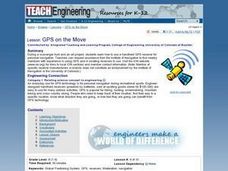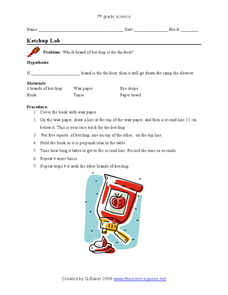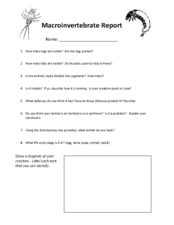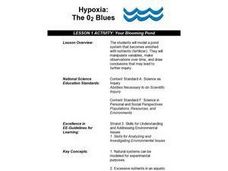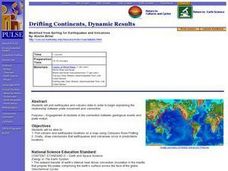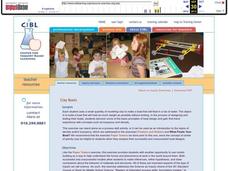Curated OER
TE Lesson: GPS on the Move
Middle schoolers participate in a scavenger hunt and a drawing activity to examine the use of Global Positioning Systems including a handheld GPS receiver for personal navigation. They practice using the GPS receivers while collecting...
Curated OER
Chromatography Lab
Students discover the components of primary and secondary colors. In this physical science lesson, students create a set up in which water will separate a color into the component colors along a piece of filter paper. Students will...
Curated OER
Simply Circuitry and Series Circuit
Students investigate a series circuit. In this physical science lesson, students use a battery, switch, and light bulbs to build an electrical circuit. Students identify the standard symbols being used in electric circuitry.
Curated OER
Coral Reefs
Students research an inhabitant of a Caribbean coral reef using a list of common organisms that live on or near it. Students then write a description of their organism and draw a picture or a 3-D model of it. Eventually they all work...
Curated OER
Tides & Lunar Cycles
Students demonstrate how the moon affects the tides, a neap tide, and spring tides by using their bodies as models. After students observe the model they created, they draw and label the diagram on a provided worksheet. They then log...
Curated OER
M & M Lab
Students investigate how selection occurs in a random population. The concept is that selection affects evolution.They demonstrate how selection occurs and will analyze shifts in the populations. They design their conclusions with M...
Curated OER
How Do Astronomers Measure Distances to Stars?
In this astronomy instructional activity, students participate in an activity using the parallax effect to measure star distances. They record their information in a data table then complete 5 fill in the blank conclusion questions.
Curated OER
Experimental Design Practice
For this experimental design worksheet, students are given two experimental scenarios to read. They answer questions about each including finding the hypothesis, the independent and dependent variables and controls. They design a graph...
Curated OER
Ketchup Lab
For this ketchup worksheet, students investigate the thickness of different types of ketchup. They hypothesize, identify their independent and dependent variables, test their hypothesis and write conclusions based on their data.
Curated OER
Macroinvertebrate Report
In this macroinvertebrates practice worksheet, 5th graders answer 8 questions about this type of animal. Students must also draw a diagram and label the parts of their macroinvertebrate.
Curated OER
You Got The Whole World In Your Hands: Geology, Earth's Layers, Science
Students make a model of the Earth's crust out of foam in order to better explain the make-up of the Earth's layers. They add continents and oceans.
Curated OER
Careers in Science
Students learn the trends in the current job market for scientists,
find where the jobs are, the range of salaries, and the job requirements.
They discover that scientists do some very interesting things, then
write a letter of...
Curated OER
Why Is Our Stream Changing?
Students test turbidity, pH, oxygen content and temperature of local stream. In this earth science lesson, students collect and record data from the experiment. They analyze findings and present it to class.
Curated OER
Science Activity for Grades 4 - 8
Learners use the scientific method and see the relationship between explanation and evidence as they investigate the effects of violence on young viewers.
Curated OER
Your Blooming Pond
Students model a pond system that becomes enriched with nutrients (fertilizer). They manipulate variables, make observations over time, and draw conclusions that may lead to further inquiry. They, in groups, simulate a pond environment.
Curated OER
How Do Weather Conditions and Lunar Cycles Affect Fishing Success?
Students use weather measuring devices to record and study weather conditions at different locations, during different times. They attempt to draw conclusions about the relationship between weather conditions, lunar cycle and fishing...
Curated OER
Fish Workings
Students observe, hypothesize, and draw conclusions regarding fish. They examine their anatomy, and how they function in their environment.
Curated OER
Are We Alone
Seventh graders collect/analyze data and draw conclusions; support reasoning by using a variety of evidence; construct logical arguments; access information at remote sites using telecommunications; apply the concept of percent;...
Curated OER
Fossil Fuels (Part III), The Geology of Coal
Do not overlook this set of lessons just because your school does not have a data analysis system. There is plenty of material here to administer a complete mini unit on the formation, distribution, and properties of coal. Since it...
Curated OER
Tracking Data Using Quickoffice on a Palm Handheld
Sixth graders keep track of the amount of garbage they threw away over 3 days time. They graph and analyze data and participate in discussions. They draw conclusions based on their data.
Curated OER
Scientific Research
Students examine the process of scientific inquiry. They develop twenty questions, categorize the questions, develop a research proposal, analyze data, draw conclusions, and explain how their research connects to the state standards.
Curated OER
The Great Food Hunt
Students locate 'animals' in various environments and draw conclusions about the survival value of structures the animals possess. They create model macaroni animals and hide them and other teams of students find them and evaluate the...
Curated OER
Drifting Continents, Dynamic Results
Students plot earthquake and volcano data using a Compass Rose Plotting. They explain the relationship between plate movement and connection. They draw conclusions that earthquakes and volcanoes occur in predictable locations.
Curated OER
Clay Boats
Seventh graders are given the opportunity to use model-building as a way to help comprehend the forces and phenomena at work in the world around them. They use both successful and unsuccessful models to make inferences, refine...


